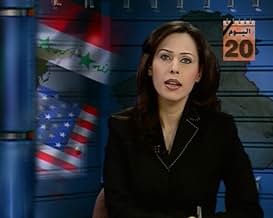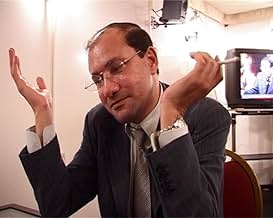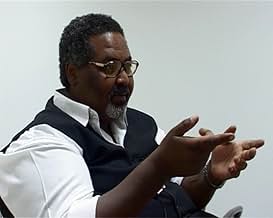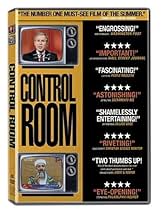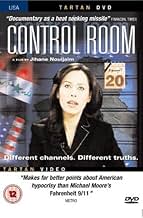CALIFICACIÓN DE IMDb
7.6/10
5.3 k
TU CALIFICACIÓN
Agrega una trama en tu idiomaA documentary on perception of the United States's war with Iraq, with an emphasis on Al Jazeera's coverage.A documentary on perception of the United States's war with Iraq, with an emphasis on Al Jazeera's coverage.A documentary on perception of the United States's war with Iraq, with an emphasis on Al Jazeera's coverage.
- Dirección
- Guionistas
- Elenco
- Premios
- 9 premios ganados y 10 nominaciones en total
Josh Rushing
- Self
- (as Lt. Josh Rushing)
George W. Bush
- Self
- (material de archivo)
Donald Rumsfeld
- Self
- (material de archivo)
- Dirección
- Guionistas
- Todo el elenco y el equipo
- Producción, taquilla y más en IMDbPro
Opiniones destacadas
I found myself watching this film by myself in the dark, got up half way into it and emailed every person in my family and extended family that they had to netflix this film.
I found that because it wasn't trying to be artsy, or controversial, or uncover any hidden secrets, this film truly worked magic in its "roll the cameras and lets see what happens" form of cinema.
I tried thinking of my favorite part of the film, but really, it was all amazing. Without making insinuations or suggestions, the film truly lets the viewer decide for himself what the real truth is, more so than in any Michael Moore film ever made on any subject. This film truly puts Michael Moore to shame.
Pay attention to every "character" in this film: they all have important roles on how the media and government, and in turn society, collide and interact.
I found it most amazing that any assumption or doubt I had about any of these characters were completely wrong in the end, and what you find is that they are all on the same side: the side of truth....the only problem is whose truth they believe.
I can't express clearly enough how important it is for everyone to see this film. If you saw Farenheit 9/11, you absolutely have to see this film. ABSOLUTELY HAVE TO SEE THIS FILM!!!!
I found that because it wasn't trying to be artsy, or controversial, or uncover any hidden secrets, this film truly worked magic in its "roll the cameras and lets see what happens" form of cinema.
I tried thinking of my favorite part of the film, but really, it was all amazing. Without making insinuations or suggestions, the film truly lets the viewer decide for himself what the real truth is, more so than in any Michael Moore film ever made on any subject. This film truly puts Michael Moore to shame.
Pay attention to every "character" in this film: they all have important roles on how the media and government, and in turn society, collide and interact.
I found it most amazing that any assumption or doubt I had about any of these characters were completely wrong in the end, and what you find is that they are all on the same side: the side of truth....the only problem is whose truth they believe.
I can't express clearly enough how important it is for everyone to see this film. If you saw Farenheit 9/11, you absolutely have to see this film. ABSOLUTELY HAVE TO SEE THIS FILM!!!!
I'll be the first to admit that this film is good but not great. All politics aside, I was just left hanging in the balance wanting MORE. Though I can appreciate their limited access to outside footage and English-speaking counterparts, certain scenes tended to drag on a bit and left me wondering what could have been.
That said, per my subject heading, I feel that this should be REQUIRED viewing for any concerned citizen grappling with the media coverage and news-spin of this and all other wars. Much like BRAVO's "Anatomy Of A Scene", the unfolding of the 'end of the war' and the subsequent toppling of Saddam's statue in the square both serve as serious examples of Al Jazeera news coverage vs. 'The Big Boys'. It's just completely different when seen through the intelligent, capable eyes of the Al-Jazeera staff than what we're spoon-fed by Fox, et. al. Check it out...... Really.....
That said, per my subject heading, I feel that this should be REQUIRED viewing for any concerned citizen grappling with the media coverage and news-spin of this and all other wars. Much like BRAVO's "Anatomy Of A Scene", the unfolding of the 'end of the war' and the subsequent toppling of Saddam's statue in the square both serve as serious examples of Al Jazeera news coverage vs. 'The Big Boys'. It's just completely different when seen through the intelligent, capable eyes of the Al-Jazeera staff than what we're spoon-fed by Fox, et. al. Check it out...... Really.....
When Defense Secretary Donald Rumsfeld declares in the early stages of the Iraq War, ''Truth ultimately finds its way to people's eyes and ears and hearts,'' I knew I would like 'Control Room.' I did feel truth peeking through the eyes of the Al Jazeera Satellite Network war coverage, perhaps the most damning moment coming when the coalition forces attack the Al-Jazeera building and kill a prominent journalist.
Egyptian-born, Harvard-educated director Jehane Noujaim, having worked with D. A. Pennebaker and Chris Hegedus on ''Only the Strong Survive'' and ''Startup.com,' is no objective documentarian: She cuts her film to the best advantage of the Arab network as the voice of the Arab oppressed and to the obvious discomfort of the ' occupying' forces, especially the US.
If you factor in her bias and listen to the occasionally reasonable Centcom Press Officer, Lt. Josh Rushing, you may yet believe that Rumsfeld's 'truth' comes more from the beleaguered Arab network than the carefully controlled coalition. But Rushing provides the most truth in the film, for instance, when he confesses, 'Our rule back here is to not spin, but sometimes we catch ourselves doing a little spin on a story. You can't help it.' Lt. Rushing is one of the more interesting characters, at first a central-casting officer spouting the Pentagon message. But when he sees film of suffering and dead American soldiers, he admits, "It makes me hate war." Regardless of which side you're on, most viewers can relate.
When an Arab producer exclaims that the drama unfolding is just like an American movie, where the god guys are easily identifiable, the bad guys will be punished, and the audience wants to know how the ending will be reached, the director mixes fiction and reality in a way that reminds all students of film there cannot be truly unbiased films once someone picks up a camera.
Let 'Control Room' stand tall next to last year's Earl Morris documentary 'Fog of War,' starring a still-sharp and still-deluded Robert McNamara, looking a bit like Donald Rumsfeld. His statement about Al Jazeera, ''We are dealing with people who are willing to lie to the world to make their case,'' is too ironic to be left out of a documentary that makes a liberal criticism of the neocons' great war seem, well, believable.
There are so many secrets and lies in the world political scene today that I am reminded of Joseph Conrad's Marlow in 'Heart of Darkness,' who said there was 'a flavor of mortality in lies, -- which is exactly what I hate and detest in the world -- what I want to forget.' The official body count in Iraq may be mute testimony to the legacy of lies. Like the 9/11 Commission report on the lack of connection between Iraq and al Quaida, 'Control Room' tries to balance the scales before Michael Moore's 'Fahrenheit 9/11' upsets it even more.
Egyptian-born, Harvard-educated director Jehane Noujaim, having worked with D. A. Pennebaker and Chris Hegedus on ''Only the Strong Survive'' and ''Startup.com,' is no objective documentarian: She cuts her film to the best advantage of the Arab network as the voice of the Arab oppressed and to the obvious discomfort of the ' occupying' forces, especially the US.
If you factor in her bias and listen to the occasionally reasonable Centcom Press Officer, Lt. Josh Rushing, you may yet believe that Rumsfeld's 'truth' comes more from the beleaguered Arab network than the carefully controlled coalition. But Rushing provides the most truth in the film, for instance, when he confesses, 'Our rule back here is to not spin, but sometimes we catch ourselves doing a little spin on a story. You can't help it.' Lt. Rushing is one of the more interesting characters, at first a central-casting officer spouting the Pentagon message. But when he sees film of suffering and dead American soldiers, he admits, "It makes me hate war." Regardless of which side you're on, most viewers can relate.
When an Arab producer exclaims that the drama unfolding is just like an American movie, where the god guys are easily identifiable, the bad guys will be punished, and the audience wants to know how the ending will be reached, the director mixes fiction and reality in a way that reminds all students of film there cannot be truly unbiased films once someone picks up a camera.
Let 'Control Room' stand tall next to last year's Earl Morris documentary 'Fog of War,' starring a still-sharp and still-deluded Robert McNamara, looking a bit like Donald Rumsfeld. His statement about Al Jazeera, ''We are dealing with people who are willing to lie to the world to make their case,'' is too ironic to be left out of a documentary that makes a liberal criticism of the neocons' great war seem, well, believable.
There are so many secrets and lies in the world political scene today that I am reminded of Joseph Conrad's Marlow in 'Heart of Darkness,' who said there was 'a flavor of mortality in lies, -- which is exactly what I hate and detest in the world -- what I want to forget.' The official body count in Iraq may be mute testimony to the legacy of lies. Like the 9/11 Commission report on the lack of connection between Iraq and al Quaida, 'Control Room' tries to balance the scales before Michael Moore's 'Fahrenheit 9/11' upsets it even more.
For me, Al-Jazeera means one thing: proof. When I think of how skewed and yellow video journalism is, I remember that millions and millions of people in the world are getting their news from Al-Jazeera. That's my proof that there is hope for the world. That they are willing to challenge and question everything from Arab leaders to the United States to the nature of unbiased news coverage
Since their start in 1996, they've been slammed in the Arab world for being too pro-American and by the US for being pro-Al Qaeda. As most good lefties know, that usually means you're doing something right. I have much respect for Al-Jazeera and was excited to know that a documentary was being made about them and their take on the War with Iraq.
The film "Control Room" is further proof. With time-tested verité technique, we see what it is like to run Al-Jazeera and what kinds of people make up the staff from the translators to the journalists. The film travels back and forth between the stations headquarters in Qatar and CentCom which is the main press briefing room set up by the US military in Iraq. It's a breath of fresh air to see an entire network of people who are smart and committed to the idea of debate and communication. I don't think you could find that at any of the major news networks in the States. Their operations, anecdotes and analysis are worthy of a documentary alone.
But there are specific moments in the film that are especially profound and upsetting even to a long-time commie like myself. First and foremost, there is the death of an Al-Jazeera journalist. Before the troops entered Baghdad, the US committed air strikes on civilian targets including the building housing Al-Jazeera. In the attack, one of their correspondents is killed along with three other journalists. There is footage of the journalist facing him head-on right up until seconds before the attack. That along with a plea for justice from the journalist's wife and a completely absurd justification for the attack from the US is both infuriating and literally sickening.
The second most important moment in the film is the so-called liberation of Baghdad. As a result of the attack on Al-Jazeera, their remaining correspondents were forced to return home to Qatar where the network is based. Now recognized as a target of the US military, Iraqis were naturally hesitant to house anyone representing the station. In the end, only the ridiculous foreign press was there to cover the troops coming into the town square and the people toppling over the statue of Saddam Hussein. What's most illuminating is the analysis from the Al-Jazeera journalists as they watch the events unfold. Senior Producer Samir Khader talks about how he's from Iraq. He's lived in Iraq. The people that toppled the statue were not Iraqi. They didn't look Iraqi and they didn't have Iraqi accents. Another journalist wonders why there are only a dozen people celebrating. Where were the village people? Where were the women from the area? How is it that one of them just happened to have the old Iraqi flag in his pocket? Had he "just kept it there for the past ten years?" Producer Deema Khatib wonders where the troops were. Where was the army? It becomes very obvious, as people have been muttering for some time now that it was all a faked, staged event for Western "news" cameras.
Finally there is the case of Lt. Josh Rushing. Throughout the film, he is the American representative that has debates and discussions with the many Arab journalists. Despite having to take the absurd position of defending US aggression, he is intelligent and empathetic. At one point he becomes self-analytical and candid talking about how he had seen images of dead Iraqi casualties one day and it didn't affect him. The next day, he was footage of American casualties and it made him sick. At that point he really had to face himself and while still in the process at least recognize how much he hates war. That story doesn't end there. With the release of the film, the Pentagon ordered Rushing not to comment on the film. Offended by this gesture, he is now seeking to leave the Marines.
"Control Room" is a movie about the War with Iraq. But that's not the half of it. It's a movie that will hopefully widen the debate about television and what is objective journalism in this country. It's also another stone catapulted through the wall of Arab stereotypes. It's also an intelligent and engaging film that is as challenging as it is satisfying.
The film "Control Room" is further proof. With time-tested verité technique, we see what it is like to run Al-Jazeera and what kinds of people make up the staff from the translators to the journalists. The film travels back and forth between the stations headquarters in Qatar and CentCom which is the main press briefing room set up by the US military in Iraq. It's a breath of fresh air to see an entire network of people who are smart and committed to the idea of debate and communication. I don't think you could find that at any of the major news networks in the States. Their operations, anecdotes and analysis are worthy of a documentary alone.
But there are specific moments in the film that are especially profound and upsetting even to a long-time commie like myself. First and foremost, there is the death of an Al-Jazeera journalist. Before the troops entered Baghdad, the US committed air strikes on civilian targets including the building housing Al-Jazeera. In the attack, one of their correspondents is killed along with three other journalists. There is footage of the journalist facing him head-on right up until seconds before the attack. That along with a plea for justice from the journalist's wife and a completely absurd justification for the attack from the US is both infuriating and literally sickening.
The second most important moment in the film is the so-called liberation of Baghdad. As a result of the attack on Al-Jazeera, their remaining correspondents were forced to return home to Qatar where the network is based. Now recognized as a target of the US military, Iraqis were naturally hesitant to house anyone representing the station. In the end, only the ridiculous foreign press was there to cover the troops coming into the town square and the people toppling over the statue of Saddam Hussein. What's most illuminating is the analysis from the Al-Jazeera journalists as they watch the events unfold. Senior Producer Samir Khader talks about how he's from Iraq. He's lived in Iraq. The people that toppled the statue were not Iraqi. They didn't look Iraqi and they didn't have Iraqi accents. Another journalist wonders why there are only a dozen people celebrating. Where were the village people? Where were the women from the area? How is it that one of them just happened to have the old Iraqi flag in his pocket? Had he "just kept it there for the past ten years?" Producer Deema Khatib wonders where the troops were. Where was the army? It becomes very obvious, as people have been muttering for some time now that it was all a faked, staged event for Western "news" cameras.
Finally there is the case of Lt. Josh Rushing. Throughout the film, he is the American representative that has debates and discussions with the many Arab journalists. Despite having to take the absurd position of defending US aggression, he is intelligent and empathetic. At one point he becomes self-analytical and candid talking about how he had seen images of dead Iraqi casualties one day and it didn't affect him. The next day, he was footage of American casualties and it made him sick. At that point he really had to face himself and while still in the process at least recognize how much he hates war. That story doesn't end there. With the release of the film, the Pentagon ordered Rushing not to comment on the film. Offended by this gesture, he is now seeking to leave the Marines.
"Control Room" is a movie about the War with Iraq. But that's not the half of it. It's a movie that will hopefully widen the debate about television and what is objective journalism in this country. It's also another stone catapulted through the wall of Arab stereotypes. It's also an intelligent and engaging film that is as challenging as it is satisfying.
Control Room is the latest film from the Egyptian-born Harvard-educated director of startup.com, Jehane Noujaim.
It follows the only independent news service in the Middle East, Al Jazeera, for six weeks, starting one week before the US invasion of Iraq in 2004.
The war's press coverage was delivered from US military Central Command in Qatar, right near Al Jazeera's HQ. One of the things Control Room demonstrates is just how manufactured the news stories of the war were.
We hear from several Al Jazeera employees (including women), some Western journalists and also from US Lieutenant Josh Rushing, the idealistic Central Command Press Officer.
There are several reasons why Control Room is compelling viewing. Firstly because Al Jazeera is an independent satellite service in a culture which does not have a history of freedom of the press.
Also, because both the US Government and many Middle Eastern governments condemn Al Jazeera for broadcasting propaganda, it reminds me of the conundrum often facing Australia's ABC. Yes, Al Jazeera gets it wrong sometimes, like any other broadcaster, but they are attempting and I'd suggest, often succeeding, at delivering relatively balanced journalism.
One of the things most criticized about Al Jazeera was for broadcasting messages from Osama Bin Laden. But I think just about any network that had that exclusive would do the same thing, as demonstrated by so many networks quoting the Bin Laden tapes. Unfortunately this is not covered in the film, but another Al Jazeera technique criticized in Control Room is their decision to broadcast footage of US military hostages, including the dead. As an NBC correspondent said, they just don't do that kind of thing in America. But it's very common for Western viewers to see and be shocked by horrific images on television. By broadcasting footage of these US soldiers, at least some of the Al Jazeera demographic would empathize with the suffering Westerners. Before that, much of their footage was of how Iraq's civilian population was suffering. In hindsight, now that it's been revealed that the US tortured prisoners, Al Jazeera's stance seems vindicated.
It follows the only independent news service in the Middle East, Al Jazeera, for six weeks, starting one week before the US invasion of Iraq in 2004.
The war's press coverage was delivered from US military Central Command in Qatar, right near Al Jazeera's HQ. One of the things Control Room demonstrates is just how manufactured the news stories of the war were.
We hear from several Al Jazeera employees (including women), some Western journalists and also from US Lieutenant Josh Rushing, the idealistic Central Command Press Officer.
There are several reasons why Control Room is compelling viewing. Firstly because Al Jazeera is an independent satellite service in a culture which does not have a history of freedom of the press.
Also, because both the US Government and many Middle Eastern governments condemn Al Jazeera for broadcasting propaganda, it reminds me of the conundrum often facing Australia's ABC. Yes, Al Jazeera gets it wrong sometimes, like any other broadcaster, but they are attempting and I'd suggest, often succeeding, at delivering relatively balanced journalism.
One of the things most criticized about Al Jazeera was for broadcasting messages from Osama Bin Laden. But I think just about any network that had that exclusive would do the same thing, as demonstrated by so many networks quoting the Bin Laden tapes. Unfortunately this is not covered in the film, but another Al Jazeera technique criticized in Control Room is their decision to broadcast footage of US military hostages, including the dead. As an NBC correspondent said, they just don't do that kind of thing in America. But it's very common for Western viewers to see and be shocked by horrific images on television. By broadcasting footage of these US soldiers, at least some of the Al Jazeera demographic would empathize with the suffering Westerners. Before that, much of their footage was of how Iraq's civilian population was suffering. In hindsight, now that it's been revealed that the US tortured prisoners, Al Jazeera's stance seems vindicated.
¿Sabías que…?
- Citas
Lt. Josh Rushing: It makes me hate war, but it doesn't make me believe that we're in a world that can live without war yet.
- Bandas sonorasControl Room Intro Theme
Written by Kinan Azmeh and Dinuk Wijeratne on a theme by Béla Bartók (as Bartok)
Performed by Kinan Azmeh and Dinuk Wijeratne
Courtesy of Kinan Azmeh and Dinuk Wijeratne
Selecciones populares
Inicia sesión para calificar y agrega a la lista de videos para obtener recomendaciones personalizadas
Detalles
Taquilla
- Total en EE. UU. y Canadá
- USD 2,589,616
- Fin de semana de estreno en EE. UU. y Canadá
- USD 27,125
- 23 may 2004
- Total a nivel mundial
- USD 2,724,826
Contribuir a esta página
Sugiere una edición o agrega el contenido que falta

Principales brechas de datos
By what name was Control Room (2004) officially released in Canada in English?
Responda


